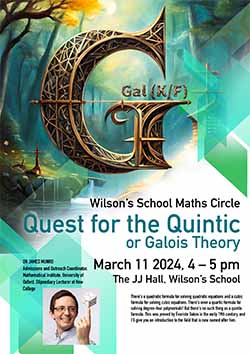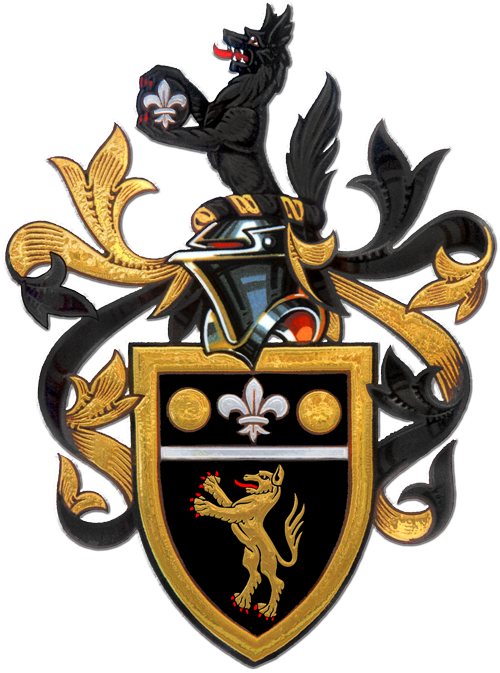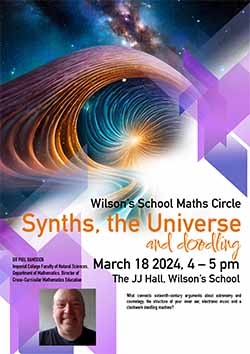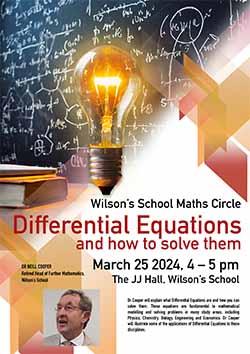Mathematics
The mathematics department at Wilson’s is thriving and exceptionally successful. All pupils are fully engaged and stretched by high quality enrichment material which goes well beyond exam board specifications. The department is committed to challenging its pupils and providing a varied and engaging mathematical experience for them.
In years 7 and 8, students develop firm foundations by studying topics from the Key Stage 3 National Curriculum to a much greater depth. In years 9 to 11, students follow our ambitious GCSEplus programme of study which extends students significantly beyond GCSE and paves the way for A Level.
Our Staff
- Mr Alderson (Assistant Head)
- Ms Bickerstaff
- Mr Burrows
- Mr Dixon
- Mr Elwood (House Coordinator and DofE Manager)
- Dr Hubbard (Medical Preparation Coordinator)
- Mr Hudson (Director of Mathematics)
- Mrs Heathcote
- Mr Jerrom (University Preparation: Mathematics-based courses)
- Mr Oldfield (Assistant Director of Mathematics — Head of Key Stage 5)
- Ms Paschoud (Teaching Lead — Mathematics)
- Mrs Rata (Assistant Director of Mathematics — Key Stage 3 and Enrichment)
Key Stage 3
Pupils are taught the Mathematics – Key Stage 3 section from the Key Stage 3 National Curriculum Secondary national curriculum. Further to this, the Key Stage 3 Programme of Study goes well beyond the national curriculum with greater depth, enriching investigations and specific Key Stage 4 topics.
Year 7
Number: BIDMAS, rounding, estimating, indices, factors and multiples
Algebra: expressions, equations, simplifying, linear sequences, straight line graphs, trial and improvement
Data Handling: probability
Shape, Space & Measure: transformations, symmetry, perimeter and area
Number: fractions, decimals, ratio and proportion
Data Handling: data representation, averages
Shape, Space & measure: angle and shape properties, angles in polygons, 3D shape and nets, constructions
Year 8
Number: indices, standard form, percentages, compound measure
Shape, Space & Measure: bearings, similarity, congruency, Pythagoras’ theorem
Data Handling: scatter graphs and cumulative frequency, box lots, data project
Algebra: expanding double brackets, factorising quadratics, rearranging formula, simultaneous equations, inequalities
Data Handling: frequency trees and probability tree diagrams
Shape, Space & Measure: circles, volume and surface area, trigonometry, real life graphs
KS3 Core Concepts
| 1 Number |
EXCEEDING: Confident with expressing numbers in different ways and will choose the most appropriate form in a given scenario. They are highly accurate in their calculations and strive for perfection in their answers. SECURE: Completely confident with using the four operations on rational numbers and uses BIDMAS to carry these out in the correct order. They can confidently convert between fractions, decimals and percentages and can solve problems involving these. Students use the concepts and vocabulary of special types of numbers and can find the prime factorisation of large numbers. Students understand the meaning of integer and fractional indices and can use the index laws to manipulate numbers expressed in this form, including numbers in standard form. Students understand how two variables can change in relation to one another and can use ratio or proportion to express this. They are confident at solving worded problems that involve ratio or proportion. When doing calculations, students can round numbers to a given degree of accuracy, as well as using approximation or a calculator when needed. DEVELOPING: Has an understanding of the importance of BIDMAS, but need to practise working with brackets, indices and negative numbers to develop knowledge of these further and improve accuracy in numerical calculations including with fractions, decimals, ratio and proportion. |
| 2 Algebra |
EXCEEDING: Very confident at applying skills of algebraic manipulation and are able to select an appropriate method to solve an abstract problem. Their understanding of the rules of algebra is so strongly embedded that it can be used with ease. They are able to link the different areas of algebra with confidence, as well as linking algebra to the other key concepts of Mathematics. SECURE: Confident at forming and manipulating algebraic expressions, equations and inequalities and express these graphically. These should include the use of brackets, negatives and fractions. They have a good understanding of the rules of algebra. They are able to spot patterns and describe them algebraically. They are confident with solving equations using algebraic methods. Students can interpret real life graphs and produce linear graphs using equations in x and y. DEVELOPING: Has an understanding of the rules of algebra, but needs to develop skills in manipulating more advanced algebraic expressions and equations, they also need to practise showing all appropriate algebraic working correctly when solving equations or rearranging formulae. |
| 3 Space, shape and measure |
EXCEEDING: Has excellent spatial awareness and are able to visualise shape and space problems to help them to tackle them with confidence. They are able to solve a complex problem by using their knowledge of key geometrical facts to break it down into manageable steps. SECURE: Able to find out unknown measurements of a range of 2D shapes including area, perimeter, side length and angles. They are able to recall and apply key geometrical facts including the properties of 2D shapes, angle rules and Pythagoras’ Theorem. Students can identify faces, edges and vertices of 3D shapes, can find the volumes and surface areas of prisms and are able to represent composite 3D shapes visually using different methods. Students can draw key constructions using a compass and straight edge and use this to solve loci problems. They are able to carry out and identify the four transformations and have a good understanding of reflective and rotational symmetry. DEVELOPING: Has the ability to recall key geometrical facts, but needs to practise applying these to more advanced shape and space problems for 2D and 3D shapes. Students understand the four transformations, but need to practise applying these to more advanced examples. |
| 4 Date handling |
EXCEEDING: Has a natural understanding of the concept of probability and can apply the rules with ease to complex worded problems. Their diagrams display a high level of accuracy and clarity so that any analysis from the diagram is also highly accurate. SECURE: Can represent discrete and continuous data using a range of graphs and charts. They are able to analyse data given in a range of formats and compare sets of data using key values. Students can calculate key values to represent both discrete and continuous data including the mean, mode and median, and measures of spread. They understand the significance of these key values and when it is appropriate to use each one, and can use their understanding of averages to solve reverse problems. Students understand and can calculate the probability of one or two events occurring. They are able to use a range of diagrams to help simplify probability problems including tree diagrams, sample space diagrams and Venn diagrams. DEVELOPING: Has the ability to draw a range of graphs and charts, but needs to practise drawing diagrams to increase the accuracy and clarity of these. Students understand the rules of probability, but need to practise applying these to more advanced problems. |
Key Stage 4
All pupils are prepared for Edexcel’s (9-1) GCSE higher tier exam.
This is assessed by three terminal examinations, one non-calculator, and two calculator. The GCSE mathematics course builds on the areas of mathematics which students have already studied in Years 7 and 8:
- number
- algebra
- ratio, proportion and rates of change
- geometry and measures
- probability
- statistics
Pupils also continue to develop their skills in using and applying mathematics by completing investigations and maths challenge questions.
All students cover work that extends and enriches the curriculum beyond the normal GCSE including AQA Level 2 Further Maths and A Level topics. Students who consistently demonstrate outstanding ability and diligence in mathematics, with no concerns in other subjects, may have the option to be entered for the AQA Level 2 Further Maths exams in Year 11.
Key Stage 5
Mathematics
Sixth form pupils study the OCR Mathematics (A) A Level specification.
A Level Mathematics is a broad based mathematics course that covers the essential elements of pure mathematics and also covers applied mathematics through the study of statistics and mechanics.
Pupils learn essential mathematical skills and processes whilst developing approaches to problem solving and mathematical argument, language and proof. Mathematical modelling techniques are also studied as approaches to solving applied mathematics problems in Statistics and Mechanics.
In particular, there is a focus on the use of technology including the study of a large data set in statistics.
Further Mathematics
Sixth form pupils who take Further Mathematics study the OCR Further Mathematics (A) A Level specification.
The A Level Further Mathematics course is broader and deeper than A-level mathematics and introduces new mathematical concepts that have wide applications in engineering, physical sciences, economics and computing.
The Pure Core provides the foundations for further mathematical study upon which learners study Statistics and Mechanics.
As per normal mathematics, there will also be overarching themes of mathematical argument, language and proof, mathematical problem solving and mathematical modelling that will be running throughout the course.
Support
Enrichment
We provide a large number of extra-curricular opportunities for students and arrange for students to take part in the UKMT maths challenges, the UKMT Team Maths Challenge, the Hans Woyda Team maths tournament and special programmes for sixth form students who are planning to study maths or a related subject at university. There are also weekly problem solving clubs and a maths society that is run by 6th formers, all of which are very popular. We also promote “Puzzle of the Week”, “Parallel”, “Ritangle” and other competitions and have many students taking part. In addition, we run a series of Maths Circle lectures for sixth form students from local schools, often including talks from top university academics.
Maths Extra
Come along if you are:
- stuck on your homework
- not sure about a new topic
- trying to improve your maths in general
| Key Stage | Year Group | Time | Location |
| Key Stage 3 Maths Extra | Years 7 & 8 | Wednesdays 1.20 – 1.55 pm | F16 |
| Key Stage 4 Maths Extra | Years 9, 10 & 11 | Tuesdays 1.20 – 1.55 pm | F14 |
| Key Stage 5 Maths Extra | Years 12 & 13 | Tuesdays 1.20 – 1.55 pm | F11 |
Departmental Co-Curricular, Trips and Enrichment Opportunities
We have a dedicated programme for extra-curricular activities and provide a large number of opportunities for students to extend and enrich their mathematics well beyond the classroom. Each week, we have problem-solving clubs at each Key Stage, which prove to be very popular. There are also many competitions throughout the year including the Southampton University Maths Challenge, the Cipher Challenge, Parallel and Ritangle that are all have may students taking part. There are also a number of team competitions including the Hans Woyda maths tournament, the UKMT Team Maths Challenge, Maths Feast and Naboj. All students take part in the UKMT maths challenges.
A significant number of pupils, some of exceptional calibre, go on to study mathematics or a related subject at university and we offer a special programme of support including preparation for entrance exams (such as MAT, TMUA and STEP) and interviews. As such, students applying for maths at university, or other STEM subjects, receive the very best support and structure in terms of preparation.
In addition, we run a series of Maths Circle lectures each year for sixth form students from local schools which often have distinguished speakers and prove to be very popular indeed.
Maths Circle
2024 Series of Lectures: "The Three Doctors"
Each year we run a very successful programme of Maths Circle lectures which are open to 6th formers from all schools in the local area. Details of the 2024 lecture series are attached below.
Click on image to download printable pdf
11 March
Quest for the Quintic, or Galois Theory
Dr James Munro
University of Oxford
18 March
Synths, the Universe and Doodling
Dr Phil Ramsden
Imperial College, London
25 March
Differential Equations and how to solve them
Dr Neill Cooper
Wilson’s School
Examples of marked work
See below for examples of marked work which demonstrate the level of work and ‘green pen’ engagement required to maximise progress in each Key Stage. Whilst we expect students to engage with this positively and if necessary, seek clarification from teachers, please be assured that in-lesson support is always available.
· KS3
· KS4
· KS5



